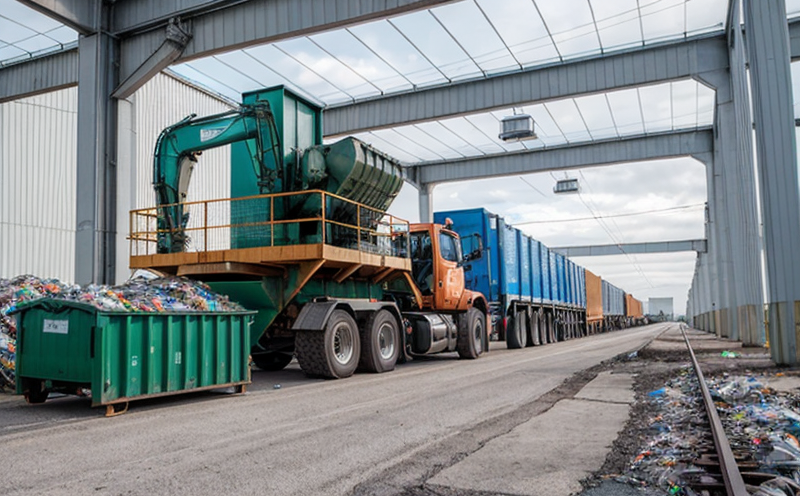ISO 18604 Packaging Material Recycling Testing
The ISO 18604 standard is a cornerstone in the realm of industrial recycling and circular economy processes. It specifies the requirements for mechanical properties, chemical composition, and physical characteristics that ensure packaging materials are suitable for recycling without compromising product safety or environmental impact.
Recycling packaging materials into new products requires stringent testing to ensure that recycled content does not affect the quality or performance of the final product. Compliance with ISO 18604 ensures that manufacturers can confidently use recycled materials, thereby promoting sustainability and reducing waste in industrial manufacturing processes.
The standard applies to a variety of packaging materials including plastics, metals, paperboard, and composite materials used in food and non-food applications. It sets out detailed testing procedures to evaluate the mechanical properties such as tensile strength, flexibility, and impact resistance, which are crucial for ensuring that recycled materials can withstand the rigors of manufacturing.
Chemical analysis is another critical aspect covered by ISO 18604, focusing on identifying any potential contaminants or additives in the recycled material. This ensures that the final product remains safe for its intended use and complies with relevant food contact regulations if applicable.
The standard also provides guidance on physical characteristics such as color stability, odor, and appearance to ensure that recycled materials meet aesthetic and functional requirements without compromising quality or performance.
By adhering to ISO 18604, industrial manufacturers can enhance their sustainability credentials while maintaining product integrity. This is particularly important in the context of the circular economy where minimizing waste and maximizing resource efficiency are key objectives.
The benefits extend beyond compliance with regulatory requirements; adherence to this standard allows companies to differentiate themselves through environmentally responsible practices. It also supports supply chain transparency, ensuring that all participants understand the quality and reliability expectations for recycled materials.
Scope and Methodology
The scope of ISO 18604 Packaging Material Recycling Testing encompasses a wide range of tests designed to evaluate the mechanical properties, chemical composition, and physical characteristics of packaging materials. The testing process involves several key steps:
- Sample Preparation: Samples are prepared according to specified dimensions and tolerances. This includes cutting samples from recycled materials to standard sizes for mechanical testing.
- Mechanical Testing: Mechanical properties such as tensile strength, flexural modulus, impact resistance, and tear resistance are evaluated using appropriate test machines. These tests assess the structural integrity of the material under various loading conditions.
- Chemical Analysis: The chemical composition of the recycled material is analyzed to ensure it does not contain harmful substances or exceed acceptable limits for contaminants. This includes testing for heavy metals, plasticizers, and other potential hazards that could affect product safety.
- Physical Characterization: Tests are conducted to evaluate physical characteristics such as color stability, odor, and appearance. These tests ensure that the recycled material remains visually appealing and does not emit odors that could compromise the quality of the final product.
Benefits
Adhering to ISO 18604 brings numerous benefits to industrial manufacturers engaged in recycling processes. These include:
- Enhanced Product Quality: Ensures that recycled materials meet stringent quality standards, maintaining the integrity and performance of the final product.
- Sustainability Leadership: Demonstrates a commitment to sustainability by using recycled materials, thereby enhancing corporate reputation and brand image.
- Regulatory Compliance: Ensures compliance with international standards and regulations related to packaging and recycling.
- Supply Chain Transparency: Provides transparency throughout the supply chain, ensuring all stakeholders understand the quality expectations for recycled materials.
- Economic Efficiency: By reusing materials rather than disposing of them, companies can reduce waste management costs while generating additional revenue streams from recycled products.
Quality and Reliability Assurance
Ensuring the quality and reliability of recycled packaging materials is critical for maintaining product integrity. The following measures are taken to achieve this:
- Continuous Monitoring: Regular monitoring of production processes ensures that all stages of recycling meet specified standards.
- Advanced Instrumentation: High-precision instruments and test machines are used to conduct mechanical, chemical, and physical tests on recycled materials.
- Third-Party Audits: Independent audits are conducted periodically to verify compliance with ISO 18604 requirements.
- Data Analysis: Comprehensive data analysis is performed to identify trends and areas for improvement in the recycling process.





